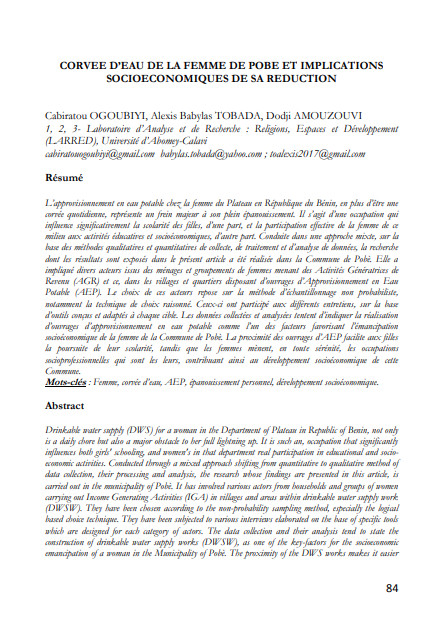Corvée d'eau de la femme de Pobé et implications socioéconomiques de sa réduction
 |
article Jun 2021 ; 15 pages
Aut. Cabiratou Ogoubiyi & Alexis Babylas Tobada & Dodji Amouzouvi
Ed. INE - Cotonou UAC - Cotonou
Téléchargeable sous format: PdF
Téléchargeable chez l'éditeur
Résumé:
L’approvisionnement en eau potable chez la femme du Plateau en République du Bénin, en plus d’être une corvée quotidienne, représente un frein majeur à son plein épanouissement. Il s’agit d’une occupation qui influence significativement la scolarité des filles, d’une part, et la participation effective de la femme de ce milieu aux activités éducatives et socioéconomiques, d’autre part. Conduite dans une approche mixte, sur la base des méthodes qualitatives et quantitatives de collecte, de traitement et d’analyse de données, la recherche dont les résultats sont exposés dans le présent article a été réalisée dans la Commune de Pobè. Elle a impliqué divers acteurs issus des ménages et groupements de femmes menant des Activités Génératrices de Revenu (AGR) et ce, dans les villages et quartiers disposant d’ouvrages d’Approvisionnement en Eau Potable (AEP). Le choix de ces acteurs repose sur la méthode d’échantillonnage non probabiliste, notamment la technique de choix raisonné. Ceux-ci ont participé aux différents entretiens, sur la base d’outils conçus et adaptés à chaque cible. Les données collectées et analysées tentent d’indiquer la réalisation d’ouvrages d’approvisionnement en eau potable comme l’un des facteurs favorisant l’émancipation socioéconomique de la femme de la Commune de Pobè. La proximité des ouvrages d’AEP facilite aux filles la poursuite de leur scolarité, tandis que les femmes mènent, en toute sérénité, les occupations socioprofessionnelles qui sont les leurs, contribuant ainsi au développement socioéconomique de cette Commune. Abstract:
Drinkable water supply (DWS) for a woman in the Department of Plateau in Republic of Benin, not only is a daily chore but also a major obstacle to her full lightning up. It is such an, occupation that significantly influences both girls' schooling, and women's in that department real participation in educational and socioeconomic activities. Conducted through a mixed approach shifting from quantitative to qualitative method of data collection, their processing and analysis, the research whose findings are presented in this article, is carried out in the municipality of Pobè. It has involved various actors from households and groups of women carrying out Income Generating Activities (IGA) in villages and areas within drinkable water supply work (DWSW). They have been chosen according to the non-probability sampling method, especially the logical based choice technique. They have been subjected to various interviews elaborated on the base of specific tools which are designed for each category of actors. The data collection and their analysis tend to state the construction of drinkable water supply works (DWSW), as one of the key-factors for the socioeconomic emancipation of a woman in the Municipality of Pobè. The proximity of the DWS works makes it easier for girls to achieve their schooling, while women carry on, with complete peace of mind, their socioprofessional occupations that help them contributing to the socioeconomic development of that Commune.
Mots clefs: |
distribution d'eau potable (CI) (DT) (OP) (ope) , femme (CI) (DT) (OP) (ope) , genre (CI) (DT) (OP) (ope) |
Pays concerné: |
Editeurs/Diffuseurs: |
|
INE
-
Institut National de l'Eau - Cotonou - Bénin |
UAC
-
Université Nationale des Sciences, Technologies, Ingénierie et Mathématiques - Cotonou - Bénin |
En cas de lien brisé, nous le mentionner à communication@pseau.org